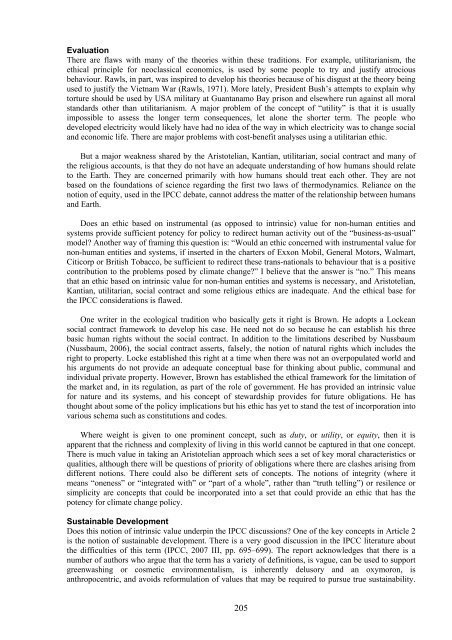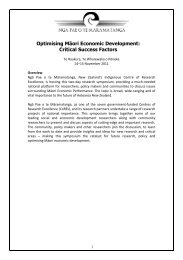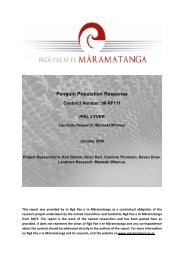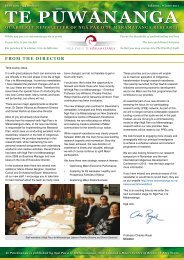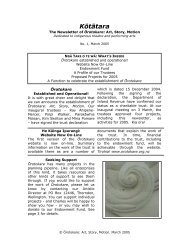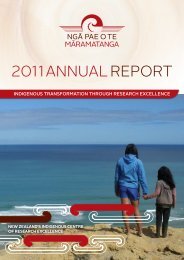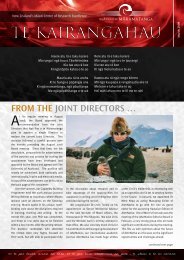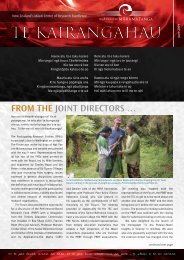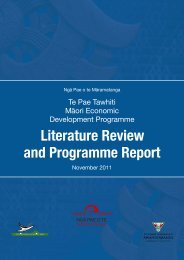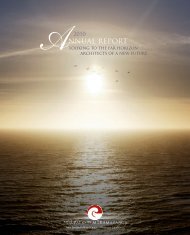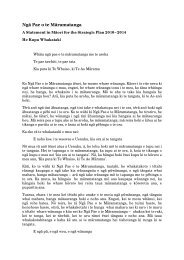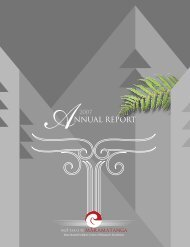traditional knowledge conference 2008 te tatau pounamu
traditional knowledge conference 2008 te tatau pounamu
traditional knowledge conference 2008 te tatau pounamu
Create successful ePaper yourself
Turn your PDF publications into a flip-book with our unique Google optimized e-Paper software.
EvaluationThere are flaws with many of the theories within these traditions. For example, utilitarianism, theethical principle for neoclassical economics, is used by some people to try and justify atrociousbehaviour. Rawls, in part, was inspired to develop his theories because of his disgust at the theory beingused to justify the Vietnam War (Rawls, 1971). More la<strong>te</strong>ly, President Bush’s at<strong>te</strong>mpts to explain whytorture should be used by USA military at Guantanamo Bay prison and elsewhere run against all moralstandards other than utilitarianism. A major problem of the concept of “utility” is that it is usuallyimpossible to assess the longer <strong>te</strong>rm consequences, let alone the shor<strong>te</strong>r <strong>te</strong>rm. The people whodeveloped electricity would likely have had no idea of the way in which electricity was to change socialand economic life. There are major problems with cost-benefit analyses using a utilitarian ethic.But a major weakness shared by the Aristo<strong>te</strong>lian, Kantian, utilitarian, social contract and many ofthe religious accounts, is that they do not have an adequa<strong>te</strong> understanding of how humans should rela<strong>te</strong>to the Earth. They are concerned primarily with how humans should treat each other. They are notbased on the foundations of science regarding the first two laws of thermodynamics. Reliance on thenotion of equity, used in the IPCC deba<strong>te</strong>, cannot address the mat<strong>te</strong>r of the relationship between humansand Earth.Does an ethic based on instrumental (as opposed to intrinsic) value for non-human entities andsys<strong>te</strong>ms provide sufficient po<strong>te</strong>ncy for policy to redirect human activity out of the “business-as-usual”model? Another way of framing this question is: “Would an ethic concerned with instrumental value fornon-human entities and sys<strong>te</strong>ms, if inser<strong>te</strong>d in the char<strong>te</strong>rs of Exxon Mobil, General Motors, Walmart,Citicorp or British Tobacco, be sufficient to redirect these trans-nationals to behaviour that is a positivecontribution to the problems posed by clima<strong>te</strong> change?” I believe that the answer is “no.” This meansthat an ethic based on intrinsic value for non-human entities and sys<strong>te</strong>ms is necessary, and Aristo<strong>te</strong>lian,Kantian, utilitarian, social contract and some religious ethics are inadequa<strong>te</strong>. And the ethical base forthe IPCC considerations is flawed.One wri<strong>te</strong>r in the ecological tradition who basically gets it right is Brown. He adopts a Lockeansocial contract framework to develop his case. He need not do so because he can establish his threebasic human rights without the social contract. In addition to the limitations described by Nussbaum(Nussbaum, 2006), the social contract asserts, falsely, the notion of natural rights which includes theright to property. Locke established this right at a time when there was not an overpopula<strong>te</strong>d world andhis arguments do not provide an adequa<strong>te</strong> conceptual base for thinking about public, communal andindividual priva<strong>te</strong> property. However, Brown has established the ethical framework for the limitation ofthe market and, in its regulation, as part of the role of government. He has provided an intrinsic valuefor nature and its sys<strong>te</strong>ms, and his concept of s<strong>te</strong>wardship provides for future obligations. He hasthought about some of the policy implications but his ethic has yet to stand the <strong>te</strong>st of incorporation intovarious schema such as constitutions and codes.Where weight is given to one prominent concept, such as duty, or utility, or equity, then it isapparent that the richness and complexity of living in this world cannot be captured in that one concept.There is much value in taking an Aristo<strong>te</strong>lian approach which sees a set of key moral charac<strong>te</strong>ristics orqualities, although there will be questions of priority of obligations where there are clashes arising fromdifferent notions. There could also be different sets of concepts. The notions of in<strong>te</strong>grity (where itmeans “oneness” or “in<strong>te</strong>gra<strong>te</strong>d with” or “part of a whole”, rather than “truth <strong>te</strong>lling”) or resilence orsimplicity are concepts that could be incorpora<strong>te</strong>d into a set that could provide an ethic that has thepo<strong>te</strong>ncy for clima<strong>te</strong> change policy.Sustainable DevelopmentDoes this notion of intrinsic value underpin the IPCC discussions? One of the key concepts in Article 2is the notion of sustainable development. There is a very good discussion in the IPCC li<strong>te</strong>rature aboutthe difficulties of this <strong>te</strong>rm (IPCC, 2007 III, pp. 695–699). The report ac<strong>knowledge</strong>s that there is anumber of authors who argue that the <strong>te</strong>rm has a variety of definitions, is vague, can be used to supportgreenwashing or cosmetic environmentalism, is inherently delusory and an oxymoron, isanthropocentric, and avoids reformulation of values that may be required to pursue true sustainability.205


